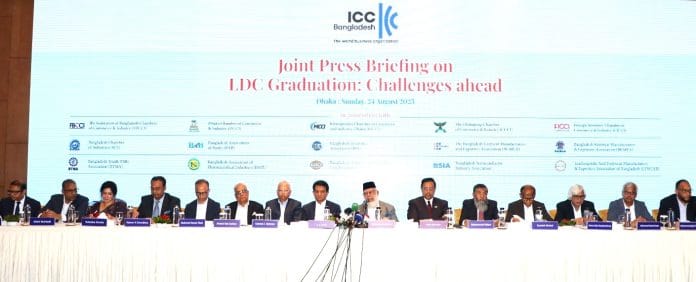Bangladesh is set to graduate from the United Nations’ Least Developed Country (LDC) category in November 2026, but the country’s top business leaders are urging the government to seek a delay, warning that the economy is not yet ready to absorb the impact of losing key trade and financial privileges.
At a press briefing on Sunday, jointly organised by ICC Bangladesh and 14 major trade bodies—including the FBCCI, DCCI, MCCI, BGMEA, BKMEA, and BAPI, concerns were raised that without an extension, Bangladesh could face serious economic setbacks following graduation.
Mahbubur Rahman, president of ICC Bangladesh, said that while graduation is a major achievement, it must be managed with urgency and foresight. “We need strategy and collective action,” he stated, “but above all, we need time.”
He and other business leaders called for a three- to five-year extension of LDC status to help the country secure trade agreements, safeguard market access, and prepare industries for increased global competition.
Among the primary concerns is the loss of duty-free access to key export markets such as the European Union and the United Kingdom.
Once Bangladesh graduates, exports could face tariffs as high as 12 percent, which businesses estimate may result in a 6 to 14 percent drop in exports. The loss of World Trade Organization benefits, such as LDC-specific subsidies and intellectual property waivers, adds to the risks.
Particularly vulnerable is the ready-made garment (RMG) sector, which makes up over 80 percent of Bangladesh’s export earnings. Industry leaders warned that tighter rules of origin and rising export costs could severely impact competitiveness.
The pharmaceutical sector is also at risk, especially as it stands to lose the TRIPS waiver that currently allows the export of affordable generic medicines.
Business leaders stressed that Bangladesh’s current economic conditions further justify a delay. External debt has reached US$103 billion, non-performing loans stand at over Tk 7.5 lakh crore, and foreign direct investment in 2024 dropped to US$1.27 billion—far behind regional peers like Vietnam.
Energy shortages, logistics challenges, and a 45 percent devaluation of the taka since 2021 have all contributed to declining competitiveness. The political and economic unrest in July 2024 added to the instability, they noted.
Speakers pointed to international precedents, noting that countries like the Maldives and Vanuatu successfully negotiated LDC graduation extensions, while Myanmar and Timor-Leste postponed their transitions entirely.
In contrast, Bhutan managed a smoother graduation by securing trade deals and diversifying its economy—something Bangladeshi business leaders argue the country is not yet prepared to do.
“The risks of rushing this transition are too high,” said Rahman. “We urge the government to formally request more time so that we can enter the next phase of development on a strong and stable footing.”
Without immediate steps to negotiate preferential trade terms, attract new investment, and strengthen domestic industries, businesses fear that Bangladesh’s LDC graduation could bring more economic harm than benefit.

